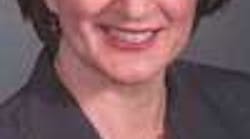by Ann-Marie C. DePalma
Can you imagine giving local anesthetics to dental hygiene patients using the "velvet touch?" The "velvet touch" is not something usually associated with injections, and that is just what Margaret Fehrenbach, RDH, MS, is trying to promote when she presents her seminars on pain control.
Margaret explains, "The pain control seminars are not just for states and hygienists who are able to practice local anesthesia, but for those who want to learn more about pain control even though they may not be able to deliver it. Pain control should be the goal of every dental professional."
She presented "Integration of Pain Control" in March at "Under One Roof" in Costa Mesa, Calif., and she will present it again this spring for the District of Columbia Dental Hygienists' Association.
In addition, Margaret presents a seminar on oral biology that is defined as "concerned with the nature of the orofacial tissues and with the application of basic scientific knowledge to orofacial tissues in health and disease." The oral biology topics range from geriatric oral lesions and women's oral health needs to diabetes and patient assessment. Margaret's goal is to provide participants with increased knowledge and understanding in both arenas.
Margaret received her master's of science in oral biology from the University of Washington Dental School, and a bachelor's of science in dental hygiene with a minor in education from the Marquette University Dental Hygiene Program. She also has a certificate in clinical research from the University of Washington. Her dental hygiene experiences are not only as an educator, but as a practitioner.
She's been employed continuously in general and prosthetic practices in Milwaukee and Seattle. Even though she is based in Seattle, Margaret still holds an adjunct instructor position with Marquette University.
Her current pain control programs came about as a result of her research background in oral biology, as well as from working in the progressive state of Washington, which has allowed local anesthetic certification for hygienists since the 1970s. Her programs emphasize anatomy with much of the information taken from her textbook Illustrated Anatomy of the Head and Neck (Saunders, 2002).
Margaret does not just talk "science" at her seminars; she incorporates e-mail messages that she receives from hygienists regarding their personal experiences. Dentists who sit in on her courses often comment that everyone practicing in the dental community and giving injections should take her refresher course.
Not only does she review basic anatomy, but Margaret provides an integration of the basic procedures needed to complete certification courses as outlined by state practice acts. Many of her seminars are co-presented with her good friend and colleague, Julienne Strasser, RDH, BS, the director of Canyon Dental Seminars in Illinois.
Participants spend the first part of each pain control certification course getting to know each other and learning to relax. Most participants have high anxiety levels because of their past poor management of dental pain control and their past stressful dental hygiene educational experiences. Margaret and Julienne consider each participant a peer who deserves full respect, and they take it from there.
By the end of the program, all participants have bonded and made peace with past dental anxieties. They even clap loudly as each receives the certificate.
Margaret is thrilled to know that she can make a difference in participant's practices, and that they can now perform hygiene with reliable pain control for their patients. She loves to see past participants who smile, thank her, and tell her how good things are going for them and their patients.
She is also thankful for her sponsors who have been very generous with their time and products — PreViser, Zila, Dentsply, Accutron, Cottrell, and Hu-Friedy.
Fehrenbach
Another course Margaret presents is a new risk assessment seminar on oral disease (oral cancer, periodontal disease and caries). This program becomes more important as dental professionals learn more about the medical/dental paradigm and evidenced based practice in dentistry. Because she feels the topic is so important, she would like to present it to every state dental hygiene meeting in the future, as well as at dental educational sites.
She presented a portion of it at the Yankee Dental Congress this year and received positive feedback. Legally, as well as ethically, hygienists need to determine their patient's risk of oral disease and individualize their treatment plans accordingly. The seminar discusses the user-friendly risk calculators utilizing the latest Internet technology.
Margaret enjoys working and sharing knowledge with others, whether from the podium or in private practice. She provides participants with detailed handouts so that they are not bogged down with notes and can visualize the graphics, which are often numerous and large! She also includes many practical concepts not found in any textbook.
Margaret's programs will keep you captivated and learning. Future seminars are noted on her website, www.dhed.net, along with links to over 500 dental hygiene sites.
Regardless of whether you can administer local anesthesia, Margaret's goal is to spread the "velvet touch" throughout the country so that more patients can benefit from increased oral care and comfort.
Ann-Marie C. DePalma, RDH, BS is a practicing hygienist in a periodontal-implant practice.She is a graduate of the Forsyth School for Dental Hygienists, is active in the Massachusetts Dental Hygienists' Association, and is a Fellow of the Association of Dental Implant Auxilliaries and Practice Management.Ann-Marie has written articles and presents programs on dental implants, TMD, and developmental delays and can be reached at [email protected].







